This story appears in the July 2025 issue of Utah Business. Subscribe.
Last month, Utah Business partnered with Dentons Durham Jones Pinegar to host a roundtable on the legal industry in Utah. This conversation was moderated by Tom Taylor, shareholder at Dentons.
How has your firm been impacted by the recent immigration of large national law firms?
N. Todd Leishman | Shareholder | Dentons Durham Jones Pinegar
We did our combination coming up on five years ago, having ceased being a locally owned and operated firm and joining a global platform. We’re a part of that wave, although we’ve still tried to stay connected to our roots here. … It’s sort of upped the game for everybody.
Jeremy Stewart | Partner | Snell & Wilmer
It kicked off with a lot of nervousness and anxiety about what this would mean, but it hasn’t had a huge impact at all. We’ve remained fairly steady in hiring. Businesses remain fairly unchanged. If we’ve seen an uptick in something, it would be that it’s given us cover on our rates a little bit.
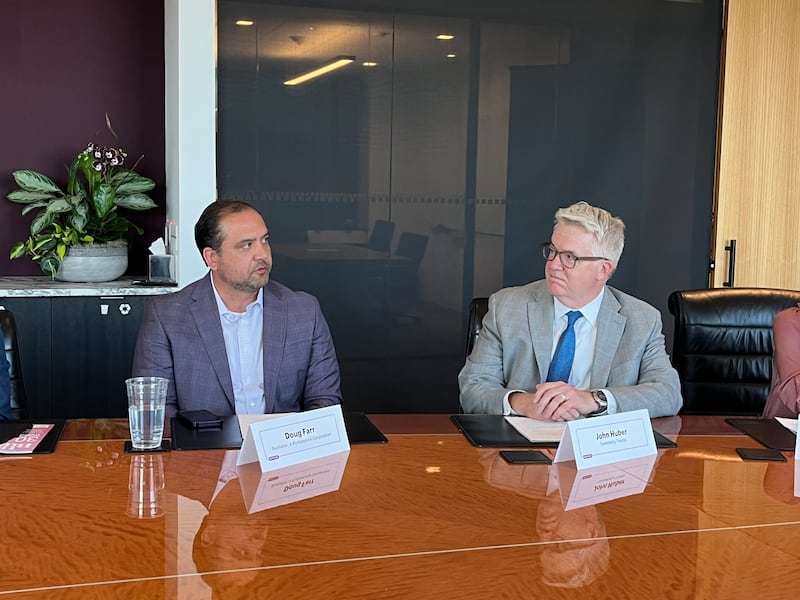
Why do you think a lot of these larger firms have identified Salt Lake as where they want to do their business?
Doug Farr | Shareholder & Salt Lake City Office Litigation Chair | Buchalter
[Buchalter] pointed to this market as one of the fastest growing markets [with] a strong economy where they saw a lot of development. … When I first started [at Buchalter], I didn’t realize that the firm already had connections to several large corporate clients here in the Salt Lake market. It just makes sense to open here.
John Huber | Shareholder | Greenberg Traurig
It’s interesting how many [larger] firms have come in; it’s really the market, the great vibrant economy we have here, plus the legal talent who’s here. … Every single one of these [larger] firms are staffed by Utah lawyers. … It’s not an outsider coming in.
Elizabeth Kronk Warner | Dean | University of Utah S.J. Quinney College of Law
Our applications to the law school have increased by 30 percent this year — those are largely out of state. … They’re really attracted to the economy, to the diversity of law firms and legal work. Interestingly, even though about 45 percent of our incoming students say that they want to go practice someplace else, 70 to 75 percent stay in the Wasatch Front area.
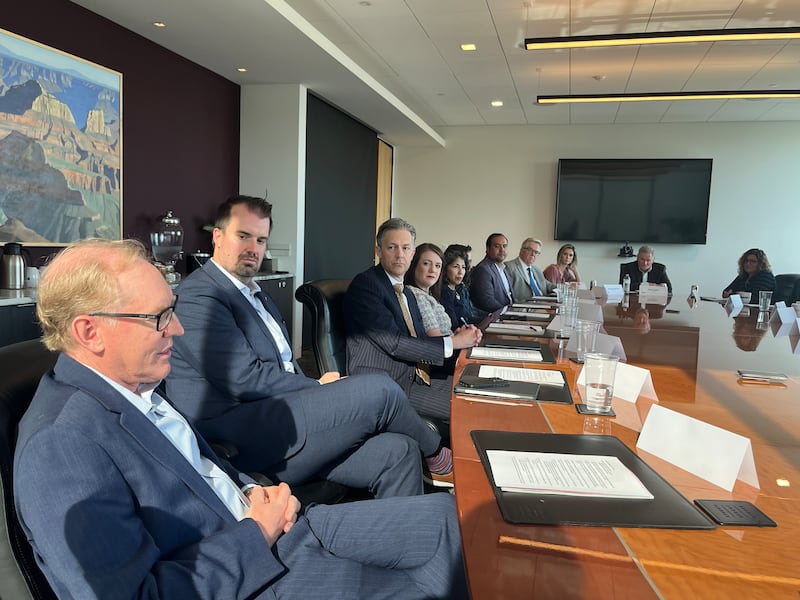
Devin Anderson | Partner | Kirkland & Ellis LLP
Five years ago, if you asked around the country about where to go in the Mountain West to practice law, most people would say Denver. Now, I think most people would say Salt Lake. They can get the same opportunities here while marrying that with all the attractive things that we have here in Utah in terms of quality of life, familial connections, etc.
Robert Walker | President | Kirton McConkie
We were initially panicked that the large firms were coming in to staff their coastal practices. But what we’ve seen is in fact the opposite of that. … Our ability to have those experiences where we don’t have to be in person has allowed us to participate in coastal and international work.
Clark Cannon | Partner | Fragomen
Fragomen’s been in the [Utah] market since 2021. We’re one of the international firms that saw the potential in the market here to establish a formal presence. Even though we didn’t have an office in Salt Lake City, we had clients here and we saw the opportunity to better support those clients and provide them with greater service.
What changes or opportunities do you expect to see over the next few years?
Jonathan O. Hafen | Shareholder | Par Brown Gee & Loveless
Utah is growing up. … We’re attracting better work, bigger clients. … We now have more lawyers than we’ve ever had before, and we’re more profitable than we’ve ever been before, which I think is all in addition to a healthy economy, a healthy legal market.
Dianna Cannon | Attorney | Cannon Disability Law
I think one thing that a small firm struggles with is trying to compete with the bigger firms to get the talent they need to grow. Because of the bigger firms that have come in, [this younger group of] attorneys is expecting more money and a work-life balance. Thirty-five years ago, that wasn’t a thing. Nobody came in saying, “Do you have flexibility? Can I work from home?”
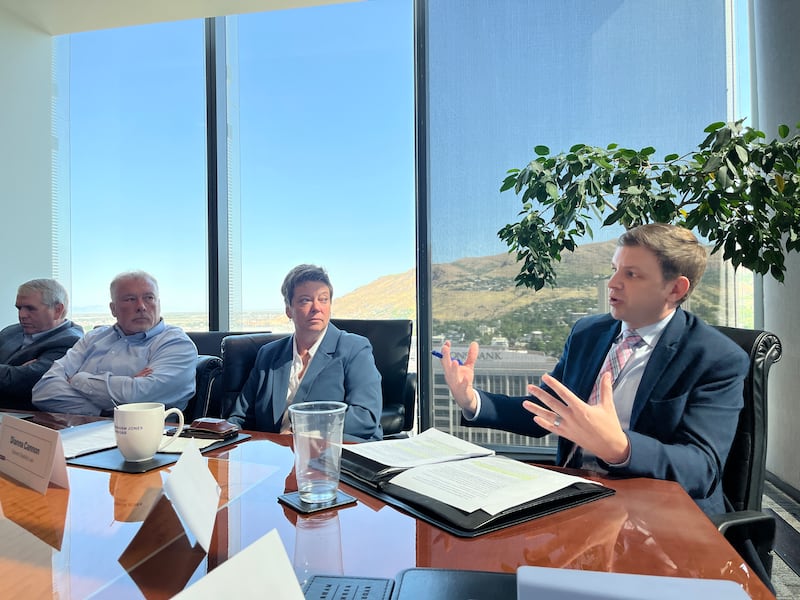
Robert Walker | President | Kirton McConkie
For our emerging generation of attorneys, the topic of the day is artificial intelligence [AI]. Whether you love it or hate it, I think we’d better embrace it and we’d better do so quickly. It will contribute to the thought of work-life balance when there’s an ability to produce work in such a quick, complete, impressive way.
Jenna Hatch | COO & Attorney | Pearson Butler
Clients are looking for strategic business partners in value creation. … We’re going to see a huge shift in that with the advent of AI. Access to the basics of law are no longer contained behind a shroud of law school. The information is not actually what we provide to our clients. It’s what to do with the information.
Betsy T. Voter | Partner | Michael Best & Friedrich LLP
Three years ago, every phone call I got was about how crypto was going to revolutionize the world. Now, that has slowed down quite a bit. We’re starting to see something really similar with AI; I don’t know that it’s going to change the industry as much as we think — capitalism [always] finds a way.
Dianna Cannon | Attorney | Cannon Disability Law
I have had to take four bars because I have a nationwide practice. … I think so many areas of the law are blurring those boundaries. They’re just not really an existing thing anymore, and it would be better perhaps to have ... something more nationwide.
How are macroeconomic conditions impacting your firm?
Whit Johnson | Partner | Foley & Lardner
It may have slowed our growth a little bit. … I know clients have held off on starting projects because they’ve been spooked by what’s going to happen. It slowed supply chains. I don’t think we totally know the answer yet, but at least for us, it still remains a good time to be in Utah and to be helping businesses thrive.
Brian A. Lebrecht | President, Director & Shareholder, Management Committee Member | Clyde Snow & Sessions
Interest rates are not necessarily at what I would consider to be high rates. … I think we’re probably more in a normal balance right now. It just feels high because of what we just came out of. It may change the way that deals are structured by buyers, but my opinion is that there’s no shortage of private equity dollars and equity capital in this country. In my transactions, debt does not play a large role, so I haven’t seen a huge impact.
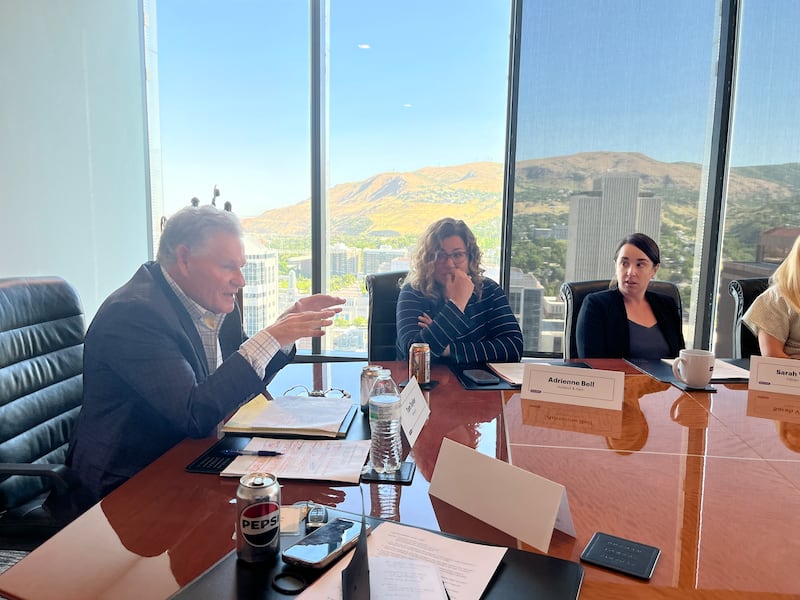
Adrienne Bell | Partner | Holland & Hart
With our affordable housing practice, the interest rate issues have had a real impact. There was a deal where they couldn’t price the bonds; that’s never happened before. I work a lot in the energy space, so the tariffs and uncertainty caused a number of deals to either pause or just fall apart. Also in the energy space, the uncertainty around certain federal tax incentives has caused the entire industry to rethink how they finance and build the projects.
How have the Trump administration’s executive orders against certain large law firms impacted your firm?
Nicole Salazar-Hall | Partner | Parsons Behle & Latimer
We haven’t really seen much of an impact. We’ve continued to maintain our commitment to our people and primarily our culture. Of course, we are very careful in who we recruit. We started on that path well before the Trump administration, ensuring that when we were recruiting … it was not based on any particular attribute of an applicant. It’s based on an overall determination of whether this person will be a good fit for our firm and if they will fit in with the culture.
Sarah Vaughn | Shareholder | Fabian VanCott
Utah has historically been a national beacon for how the judiciary can be independent and maintain the rule of law. We haven’t been impacted by the Trump executive orders, but the national sentiment against the rule of law or questioning a judge’s authority is what’s most concerning to me. … If you can’t trust the rule of law, what can you trust?
Have legal rates hit the ceiling where clients are not willing or able to pay our rates?
Michael J. Miller | Managing Partner | Strong & Hanni
I know it’s difficult to predict the transaction or fee structure sometimes, especially in litigation. With AI, with the advent of a global economy, we need to be more aggressive and thoughtful as lawyers about finding ways to [apply AI to our practice] in the right situation. Alternative fee agreements incorporating AI features are a critical component of what we need to be doing moving forward.
Betsy T. Voter | Partner | Michael Best & Friedrich LLP
Those astronomical rates that you’re seeing from coastal firms for coastal clients have created a ton of opportunity for our rate structures here in Utah. … When I’m working with clients from New York, Los Angeles or Miami, [they say,] “We love Utah. You’re half the price of our lawyer in New York City. Let’s do business.”

Have you seen clients deferring work because of the high costs?
Whit Johnson | Partner | Foley & Lardner
In terms of what I’m seeing of clients [looking for alternatives,] they’re going to ChatGPT, and I’ve gotten a lot of patents lately that were written by the clients [with ChatGPT]; they’re a nightmare.
Clark Cannon | Partner | Fragomen
Traditionally, the hourly billing model has never really worked for immigration law. For our clients, we work on a flat fee, fixed rate model [to provide cost predictability and transparency]. … What we’re seeing now is that it’s evolved [so that the services] they require from us are much more sophisticated. … A lot of that’s due to the cost implications and the uncertainty of the immigration landscape.
What opportunities are you seeing in new practice areas?
Elizabeth Kronk Warner | Dean | University of Utah S.J. Quinney College of Law
We’ve seen a lot of interesting growth with our master’s of legal studies [MLS] program, [which is] for mid-career professionals who do a lot of law but don’t want to be lawyers. … We have employers who want to hire our MLS students because if they bring a JD [Juris Doctor] into the room, the other side will clam up, versus if they bring an MLS into the room, they can have discussions.
Devin Anderson | Partner | Kirkland & Ellis LLP
Cybersecurity and data privacy are big ones. … Last year was the highest number of cyber attacks that we’ve ever seen. … You have these sophisticated criminal entities who are coming into your systems. They don’t care about stealing consumer data and selling it on the dark web — they’re coming in to lock out your systems, extort you and demand ransoms from you.
John Huber | Shareholder | Greenberg Traurig
I do local work with more local-style rates, but I also introduce Utah businesses to specialists from around the globe who can advise them on tariff, immigration or international trade issues. … As a lawyer from Magna, Utah, to be able to advise Utah companies or companies outside of Utah who want to do business here, those are exciting opportunities for lawyers in Utah.
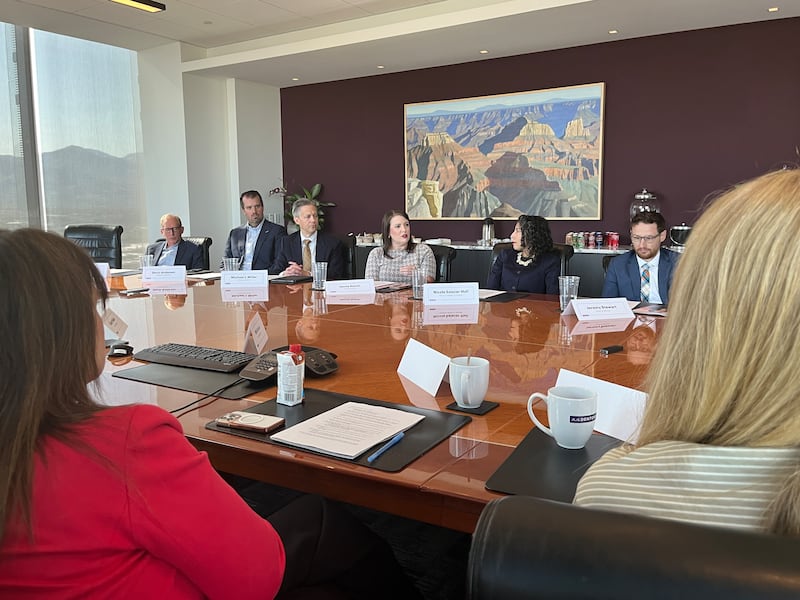
How do you deal with attorney burnout, as well as challenges with talent acquisition and retention?
Michael J. Miller | Managing Partner | Strong & Hanni
Our salaries have gone up significantly in the last couple of years. Part of that is to keep pace with the big firms that have come into the Salt Lake area and have attracted some of that talent away.
Nicole Salazar-Hall | Partner | Parsons Behle & Latimer
We’ve done three different tracks for associates. They can choose which track they pick, and it only affects their salary; it does not affect their ability to become a shareholder. … We’ve had a lot of trainings and open discussions for all members of the firm [to avoid burnout]. So far, we have not had any problems retaining any of our folks.
Adrienne Bell | Partner | Holland & Hart
We heard from one of our consultants that, industry-wide, 83 percent of associates will change firms within five years. … We’re doing mentoring, we are focusing on our culture, we are creating work-life balance, we have flex-time possibilities.
Doug Farr | Shareholder & Salt Lake City Office Litigation Chair | Buchalter
The competition that’s coming to the market has made these benefits better for our associates, paralegals and staff because there has to be more offered to attract the right people.
What issues should Utah policymakers be thinking about and focusing on to keep us at or near the top of the list in terms of economic growth and business development?
Sarah Vaughn | Shareholder | Fabian VanCott
Education. Utah has a great educated workforce, but I think there is a national sentiment against higher education in universities. If Utah can prioritize its universities and public education, we’ll continue to have a strong, educated local workforce.
Jonathan O. Hafen | Shareholder | Par Brown Gee & Loveless
We have to be very careful about not being a victim of our own success. Affordable housing is something that we are hearing about from our associates and staff. … We are law firms, but we’re also Utah businesses. If we price ourselves out of the market and it’s not someplace people want to live, then we’ve got a big problem. I’m encouraging our policymakers … to help Utah continue to be a great place to live and work.


